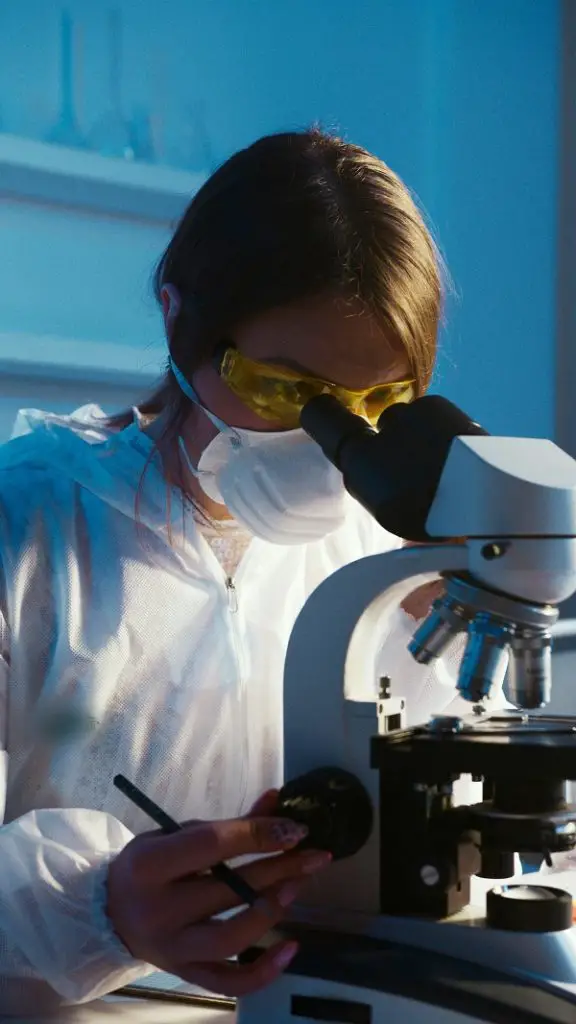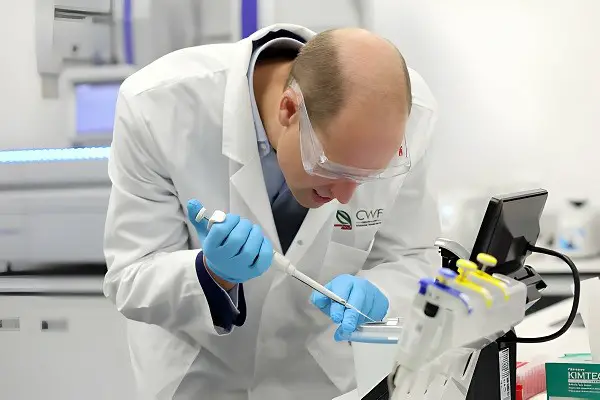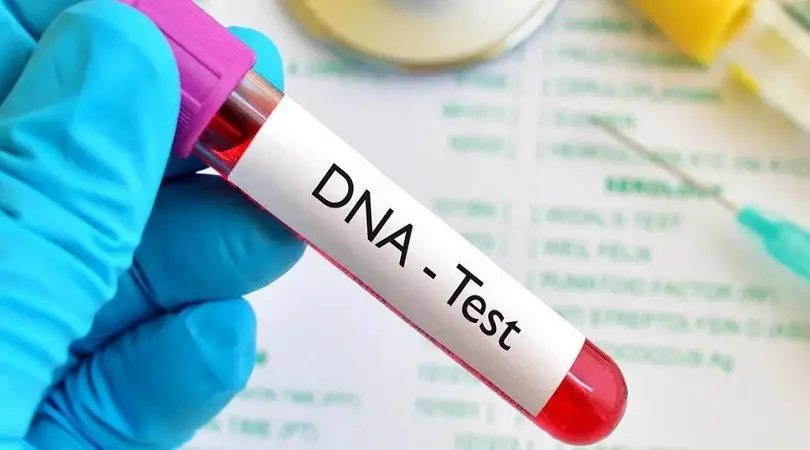Last Updated on January 6, 2025
To find a biological father without his name, take a DNA test and learn how to use the results. Consumer DNA testing is the most accurate way to determine a biological father, as it matches your DNA with others in company databases who share common DNA.
By analyzing DNA match lists and connecting with genetic cousins, it is often possible to identify a person’s likely biological father. Further DNA testing can be done to confirm the connection, if necessary.

Using DNA Testing To Determine Paternity
When it comes to finding your biological father without knowing his name, DNA testing can be an incredibly helpful tool. By taking a DNA test and understanding the process, you can potentially identify your biological father and connect with others who share your DNA. In this article, we will guide you through the steps involved in using DNA testing to determine paternity.
Take A DNA Test
The first step in using DNA testing to find your biological father is to take a DNA test. There are several DNA testing companies available, such as AncestryDNA, 23andMe, and MyHeritageDNA. Each company has its database of DNA samples and offers different features.
The Process
Once you have chosen a DNA testing company, it’s important to understand the process. DNA testing involves collecting a DNA sample, typically through a saliva or cheek swab, and submitting it to the company for analysis. The company will then compare your DNA to others in their database to find potential matches.
Choosing The Right DNA Testing Company
Choosing the right DNA testing company is crucial to increase your chances of finding your biological father. Consider factors such as the size of their database, the accuracy of their results, and the additional features they offer, such as connecting with genetic cousins.
Collecting And Submitting DNA samples
Collecting and submitting your DNA sample correctly is essential for accurate results. Follow the instructions provided by the DNA testing company to collect your sample. Most companies provide a kit with detailed instructions on how to collect your saliva or swab your cheek. Once you have collected your sample, securely package it according to the company’s guidelines and send it back for analysis.
Interpreting The Results
Once the DNA testing company has analyzed your sample, you will receive your results. These results may include information about your ethnicity, genetic traits, and potential relatives who have also taken the test. Pay close attention to any matches or potential biological fathers listed in your results.
Matching With Others In Company Databases
One of the key benefits of DNA testing is the ability to match with others in the company’s database. Genetic cousins who share a common ancestor with you can provide valuable clues about your biological father’s identity. Reach out to these matches and inquire about any information they may have regarding your potential biological father.
Identifying Potential Biological Fathers
By connecting with your genetic cousins and analyzing the shared DNA segments, you can start narrowing down potential biological fathers. Look for patterns, shared surnames, and geographical connections to identify individuals who may be your biological father. It may require further investigation and collaboration with your matches to gather additional information.
Utilizing DNA Match Lists For Further Investigation
The DNA match lists provided by the testing company can be an invaluable resource for your search. These lists show the degree of genetic relatedness between you and your matches. Analyze these lists carefully and consider reaching out to high-confidence matches who may have more detailed information about your biological father.
Exploring Genealogy Databases And Services
When it comes to searching for a biological father without his name, exploring genealogy databases and services can be an effective way to uncover valuable information. These databases and services utilize advanced technology and extensive databases to match DNA and connect individuals with potential relatives and biological fathers. Let’s explore some key avenues:
DNA Testing With Genealogy Firms
One of the most popular options is to take a DNA test with renowned genealogy firms such as AncestryDNA or 23andMe. These tests will provide you with detailed results that can be utilized to uncover your biological father’s identity. By testing with multiple companies, you can maximize your chances of finding matches.
The Benefits Of DNA Testing For Finding Biological Fathers
The benefits of DNA testing for finding biological fathers are immense. DNA tests can provide you with crucial genetic information that matches you to potential relatives who have also taken these tests. This way, you can piece together your family tree and narrow down potential biological fathers.

Matching DNA with Individuals In Genealogy Databases
Once you have received your DNA test results, you can upload them to various genealogy databases, such as GEDmatch or MyHeritage. These platforms have large databases of DNA profiles and can help you identify individuals who share a common genetic connection with you, potentially leading you to your biological father.
Connecting With Potential Relatives And Biological Fathers
Upon finding matches in genealogy databases, you can reach out to these potential relatives and inquire about any information that may help you trace your biological father. Building connections and establishing relationships with individuals who share DNA with you can provide valuable insights and lead you closer to your goal.
Working With Private Investigators
If you’re facing difficulties in your search or need professional assistance, working with private investigators can be a viable option. These investigators have the experience and resources to dig deeper into your case, conducting thorough investigations, and utilizing their expertise to help you find your biological father.
Hiring A Professional To Assist In The Search
Another option is to hire a professional genealogist or search specialist who specializes in locating biological parents. These professionals have extensive knowledge, and access to various resources, and can provide personalized guidance and assistance in your search, increasing the likelihood of success.
Utilizing Their Expertise And Resources
Genealogists and search specialists understand the intricacies involved in finding biological fathers without their names. They can utilize their expertise in DNA analysis, research, and access to exclusive databases to uncover valuable information. Their resources and experience can significantly enhance your search efforts.
Exploring genealogy databases and services is an effective approach to finding a biological father without his name. By utilizing DNA testing with genealogy firms, matching DNA with individuals in genealogy databases, connecting with potential relatives, working with private investigators, or hiring professionals, you can increase your chances of uncovering the identity of your biological father. Remember, perseverance and patience are key on this journey to discovering your roots.
Alternative Methods For Identifying Biological Fathers
If you’re wondering how to find a biological father without knowing his name, one alternative method is to take a DNA test. Consumer DNA testing can help accurately determine the biological father by matching your results with others in company databases who share common DNA with you.
By taking multiple DNA tests and learning how to use the results, you can increase your chances of identifying your biological father.
Gathering Information From Biological Mother
If you are trying to find your biological father without his name, one of the first steps you can take is to gather as much information as possible from your biological mother. She may have some details or clues about your father that can help in your search.
Discussing Potential Details Or Clues About The Father
Sit down with your biological mother and discuss any potential details or clues about your father. She might remember his physical appearance, occupation, or any significant locations or events that could lead to his identification. Make sure to take note of these details as they might be useful later in your search.
Exploring The Possibility Of A Shared Network Or Community
Another approach to finding your biological father without his name is to explore the possibility of a shared network or community. Contact relatives, friends, or anyone else who might have information about your father. Someone in your extended network may have knowledge or connections that could help in identifying your biological father.
Investigating Any Known Acquaintances Or Connections
If your biological mother has mentioned any known acquaintances or connections related to your father, it’s worth investigating these leads. Reach out to these individuals and see if they have any information about your father’s identity. Sometimes, even a small piece of information can lead to a breakthrough in your search.
Using Online Platforms And Forums
Utilize online platforms and forums dedicated to genealogy and ancestry research. These platforms can provide valuable resources, tips, and advice from others who have been in similar situations. Online forums often have active communities where you can seek assistance, share information, and collaborate with others in your quest to find your biological father.
Seeking Assistance From Online Communities And Support Groups
In addition to online platforms and forums, there are online communities and support groups specifically aimed at helping individuals search for their biological parents. These communities can provide emotional support, guidance, and practical advice on how to navigate your search and make the most of available resources.
Sharing Relevant Information And Asking For Guidance
When seeking assistance from online communities, support groups, or even private investigators, it’s important to share relevant information about your search. Be open and transparent about the details you have gathered so far, including any potential leads or clues. This will allow others to provide targeted guidance and suggestions for your search.
Collaborating With Others In Similar Situations
Consider collaborating with individuals who are also searching for their biological parents without knowing their names. Pooling resources, sharing experiences, and exchanging information can increase the likelihood of finding your biological father. Collaborative efforts often yield new perspectives and insights that can be instrumental in your search.
Frequently Asked Questions
How Do I Find An Unknown Father?
To find an unknown father, take a DNA test and learn how to use the results. Consumer DNA testing is the best way to accurately determine biological parentage. Take multiple DNA tests and compare your results with others in company databases who share common DNA.
In some cases, you may need to hire a genealogist or private investigator for further assistance.
Can You Find Out Who The Father Is Without The Father?
To find out who the father is without his presence or identity, the best option is to take a DNA test. By taking a DNA test, you can compare your results with others in the company’s database who share common DNA with you, which can help identify your biological father.
How Do I Contact My Biological Father?
To find your biological father without his name, take a DNA test and learn how to use the results. Consumer DNA testing can accurately determine your biological father by matching your DNA with others in company databases. Consider hiring a genealogist or using online resources to connect with genetic cousins and gather more details.
Once you have a possible identification, additional DNA testing can be done to confirm the connection. Try Googling for information and consider reaching out to your birth mother or adopted family for any available information.
How To Find Father’s Name?
You can find your biological father without his name by taking a DNA test and using the results to match with others in company databases who share common DNA. This is the most accurate way to determine your biological father.
Can You Find Your Biological Father Without Knowing His Name?
Yes, it is possible to find your biological father without knowing his name through DNA testing and connecting with genetic matches.
How Can DNA Testing Help In Finding A Biological Father Without His Name?
DNA testing can help by comparing your DNA with others in company databases and identifying common genetic matches that could lead to finding your biological father.
Conclusion
Taking a DNA test is the most accurate way to find a biological father without knowing his name. By matching your DNA with others in company databases, you can potentially identify relatives who share common DNA. Additionally, consider hiring a genealogist or private investigator, and reaching out to your birth mother or adopted family for information.
While it may require some luck and persistence, finding your biological father is possible with the right resources and strategies.








